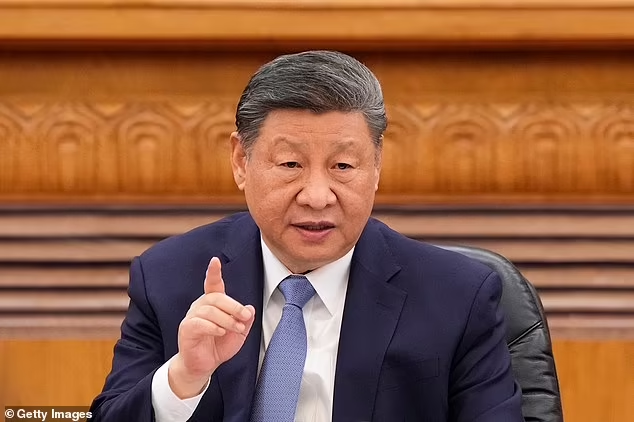China will impose a massive 84% tariff on American goods from Thursday, 50% higher than previously announced, in a massive escalation of a global trade war.
Financial markets across the world have crumbled since US president Donald Trump announced a massive raft of reciprocal tariffs on ‘Liberation Day’, in response to what the Republican leader said was exploitation of the US by other nations.
Imports to the US from almost all nations on Earth were hit with a baseline 10% levy, with Trump’s administration increasing the percentage based on trade deficits.
But China was hit particularly hard, with Trump slapping imports from Xi Jinping’s nation with an effective 104% levy.
Trump’s tariffs have caused global markets to drastically crash. So far today, the FTSE 100, an index fund detailing the value of Britain’s 100 largest firms, dropped 3.6% at time of publication.
Germany‘s DAX was down 4%, while the French CAC 40 was down 4%. US index funds are also expected to fall when they open at 2.30pm UK time.
However, Trump last night appeared unrepentant for the economic damage his decisions have caused, bragging to the National Republican Congressional Committee Dinner in Washington: ‘I am telling you, these countries are calling us up, kissing my ass.
‘They are dying to make a deal. “Please, please sir, make a deal. I’ll do anything sir.”‘
China said its revenge tariffs would take effect from around noon local time (5 am UK time) April 10, giving global supply chains less than a day to reorient themselves and piling more pressure on the world’s economy.
It added that it was putting export controls on 12 more American companies and had added six more US firms to its list of ‘unreliable entities’ that are largely banned from doing business in China or with Chinese companies.
These companies have not yet been announced.
China today told the World Trade Organisation that the US’ decision to impose these mass tariffs threatens to further destabilise global trade.
‘The situation has dangerously escalated. …As one of the affected members, China expresses grave concern and firm opposition to this reckless move,’ China said in a statement to the WTO on Wednesday that was sent to Reuters by the Chinese mission to the WTO.
The financial world has been rattled by Trump’s tariffs, and have begun to seriously question his decisions.
Dario Perkins, an economist at macroeconomic forecasting consultancy firm TS Lombard, told Bloomberg earlier this week: ‘For the first time in my career, I’m hearing widespread skepticism about the competency of US policymakers.
‘This isn’t about politics… And it isn’t about ‘policy mistakes’… It is about recklessness.
‘That is why many global investors are also making the comparison with the UK’s “Liz Truss moment”.’
Earlier today, the Bank of England said Trump’s tariffs have ‘contributed to a material increase in the risk to global growth’ and financial stability.
 The full extent of the tariffs will be levied on nations worldwide starting at midnight, though Trump announced that the ones on China were increased on Tuesday.
The full extent of the tariffs will be levied on nations worldwide starting at midnight, though Trump announced that the ones on China were increased on Tuesday.
Reciprocal Tariffs
Including currency manipulation and trade barriers
| Country | Tariffs Charged to the U.S.A. * | U.S.A. Discounted Reciprocal Tariffs |
|---|---|---|
| China | 67% | 34% |
| European Union | 39% | 20% |
| Vietnam | 90% | 46% |
| Taiwan | 64% | 32% |
| Japan | 46% | 24% |
| India | 52% | 26% |
| South Korea | 50% | 25% |
| Thailand | 72% | 36% |
| Switzerland | 61% | 31% |
| Indonesia | 64% | 32% |
| Malaysia | 47% | 24% |
| Cambodia | 97% | 49% |
| United Kingdom | 10% | 10% |
| South Africa | 60% | 30% |
| Brazil | 10% | 10% |
| Bangladesh | 74% | 37% |
| Singapore | 10% | 10% |
| Israel | 33% | 17% |
| Philippines | 34% | 17% |
| Chile | 10% | 10% |
| Australia | 10% | 10% |
| Pakistan | 58% | 29% |
| Turkey | 10% | 10% |
| Sri Lanka | 88% | 44% |
| Colombia | 10% | 10% |
| Peru | 10% | 10% |
| Nicaragua | 36% | 18% |
| Norway | 30% | 15% |
| Costa Rica | 17% | 10% |
| Jordan | 40% | 20% |
In the central bank’s Financial Stability Report, published hours before China announced the retaliatory tariff measures, it said that the economic hostility between the US and other nations has increased ‘uncertainty… for inflation globally.’
But it stressed that ‘UK household and corporate borrowers have remained resilient’, adding that it ‘maintained its judgement’ that British banks would still be able to support households and businesses even if the economy turned ‘substantially worse than expected.’
The disruption from Trump’s tariffs made it ‘imperative’ for the UK to deepen its links with the EU, UK chancellor Rachel Reeves said today.
Despite the flood of anxiety from the financial world, US Treasury Secretary Scott Bessent said he believed America’s tariffs would lead to nations signing deals favourable to the US.
He said, citing ongoing trade discussions with Japan, Vietnam, South Korea, India and Britain: ‘I think we are going to see a rapid succession of these deals that will give CEOs greater certainty.’
Bessent also warned China not to ‘devalue their way out’ of the trade war, and urged its
leaders to come to the table for a formal discussion.
More to follow.





